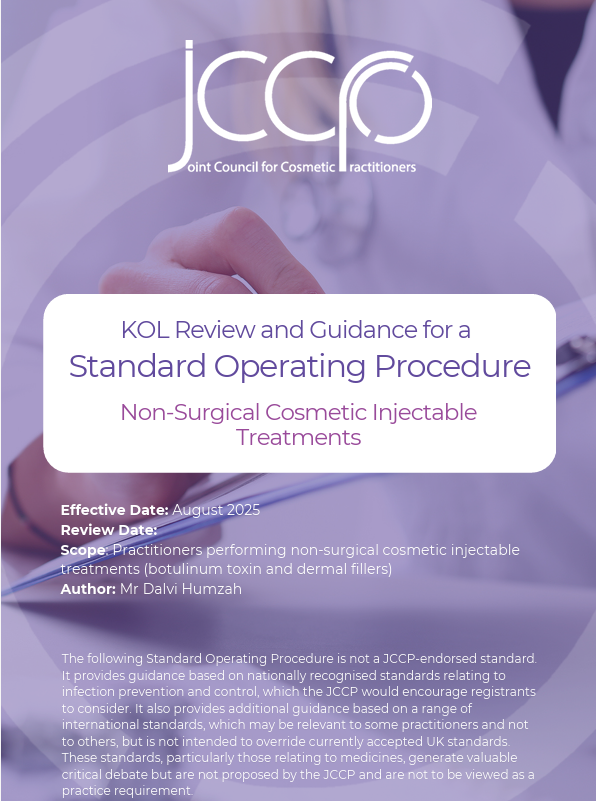Important information concerning the Standard Operating Procedure for Non-Surgical Cosmetic Injectable Treatments published on the JCCP website.
We have received several messages from our members who have expressed concerns following the release of the Standard Operating Procedure which contains information which is confusing and contradictory to current evidence and best practice for the UK.
For those that have read this document, we would like to provide clarity and a summary response to this Standard Operating Procedure (SOP):
- This SOP is based on a publication, Updated Filler Emergency Kit: Next-Generation Emergency Solution, which the document states is Regulatory Framework. This is not the case, it has not been endorsed by any Regulatory Body within the UK and due to its potentially unsafe recommendations, is extremely unlikely to do so.
- The recommendation of Aspirin 100mg for vascular support is incorrect for the UK, this dose is not readily available and based on best evidence, ACE Group World recommends a stat dose of 300mg and then 75mg daily.
- Advocating Hydrocortisone 100mg IV, Dexamethasone 8mg IM and Prednisolone 20mg for vascular support could lead to catastrophic consequences including steroid induced psychosis, severe hyperglycaemia, electrolyte disturbance leading to Acute Kidney Injury, cardiac arrhythmias and suppression of the hypothalamic-pituitary-adrenal axis to name a few.
- The dilution of Hyaluronidase is not recommended (1500u in 5ml), a lower dilution volume (1-2ml) is recommended for vascular occlusions as larger volumes could lead to further compromise due to the pressure effect.
- ACE Group World do not recommend using a 250ml bag of sodium chloride, this can be difficult to accurately withdraw an accurate dose for reconstitution. A 2ml or 5ml ampoule allows for more accurate dosing.
- Prednisolone is not routinely recommended for the treatment of a vascular occlusion, particularly in the acute phase, and the dose of 20mg is not supported by ACE Group World. Prednisolone may be beneficial in later presentations where oedema is leading to compromise but a dose of 30-40mg would be more effective. Practitioners not experienced in prescribing Prednisolone in these situations should seek advice from more experienced practitioners or ACE Group World.
- The SOP recommends the use of Dexamethasone 8mg IM and Hydrocortisone 100mg IV for the management of anaphylaxis. According to the Resuscitation Council UK (RCUK) guidelines (2021), neither hydrocortisone nor dexamethasone is recommended for the routine emergency (acute) treatment of anaphylaxis. RCUK guidelines state explicitly that corticosteroids are no longer advised for the routine emergency treatment of anaphylaxis.
- The dosage of adrenaline 1mg/ml (1:1000) stated for the treatment of anaphylaxis is not recommended by organisations or institutions within the UK. The UK Resuscitation Council (2021) recommends adults and children over 12 years should receive 500 micrograms (0.5 mg) IM (0.5 mL of 1 mg/mL, 1:1000).
- The recommendation of Pentoxifylline 400mg cannot be supported. It is a methylxanthine derivative used in vascular medicine (e.g. peripheral vascular disease, intermittent claudication), but there is not enough evidence to support this in aesthetic complications. Caution is advised in prescribing off-label medication that is not in the practioners scope of practice and experience.
- The SOP recommends Diltiazem 30mg for late occlusion, but according to latest evidence, calcium channel blockers have no discernible benefit in treating a vascular occlusion even when vascular spasm is implicated in the cause. More evidence is needed before this can be supported. Similarly, practitioners who are not experienced in this medication for this indication, should not prescribe.
- Timolol 0.5% drops (for ocular complications), Brimonidine 0.2% drops and Brinzolamide drops have been recommended in the SOP for visual impairment. Although there is evidence to suggest that Timolol can reduce intraocular pressure for cases of filler induced vascular occlusion and visual impairment, there is no evidence to support triple topical therapy. This could lead to further complications, and it is not supported by evidence or recommendations by ophthalmologists.
- Mannitol 20% 250ml IV and Acetazolamide 250mg may be considered by a specialist ophthalmology unit but not to be used in non-surgical cosmetic practice due to lack of experience and clinical oversight.
- Clostridiopeptidase ointment (collagenase) is not available through any legitimate source in the UK and should be removed from the document circulating in the UK.
- The author advocates the use of Promethazine 25mg/ml 2ml IV for the treatment of anaphylaxis. According to the UK Resuscitation Council (2021) and other major guidelines, antihistamines are not recommended as first-line or emergency treatment for acute anaphylaxis.
- For signs of infection following a vascular occlusion, the antibiotic and dosage stated in the SOP is not applicable in the UK and practitioners should refer to their local infection control policies.
- The document states the Hyalase should be administered under Ultrasound guidance. Ultrasound is not essential and if used, should only be adopted by practitioners who are experienced in its use (300-500 hours of vocational training is recommended by the Royal College).
There are several more inaccuracies and comments that contravene evidence-based practice in the document, but we only wished to highlight the points which are more concerning to provide guidance and protect our members. If you would like to view the original document, it is available on the JCCP website, by following the menu to practitioners and clinics, resources, guides, KOL Review and Guidance for a Standard Operating Procedure
Please be aware, the JCCP has issued a disclaimer for this document:
“The following Standard Operating Procedure is not a JCCP-endorsed standard. It provides guidance based on nationally recognised standards relating to infection prevention and control, which the JCCP would encourage registrants to consider. It also provides additional guidance based on a range of international standards, which may be relevant to some practitioners and not to others, but is not intended to override currently accepted UK standards. These standards, particularly those relating to medicines, generate valuable critical debate but are not proposed by the JCCP and are not to be viewed as a practice requirement.”


